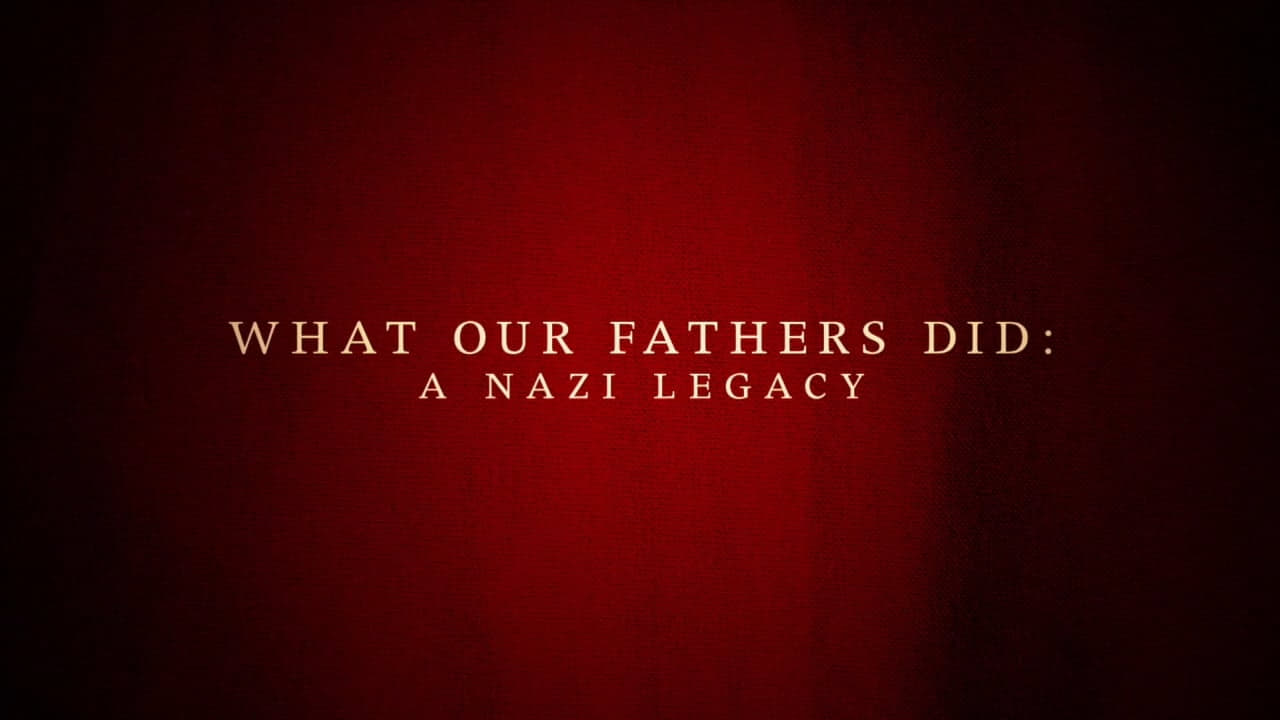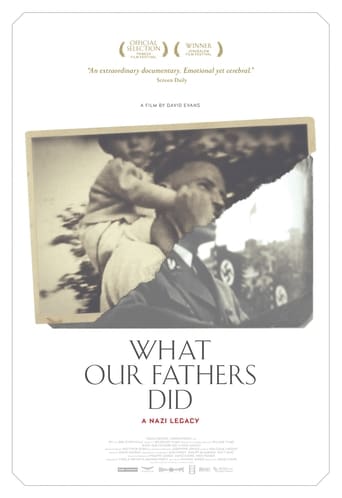

It's no definitive masterpiece but it's damn close.
... View Morean ambitious but ultimately ineffective debut endeavor.
... View MoreBlending excellent reporting and strong storytelling, this is a disturbing film truly stranger than fiction
... View Moreif their story seems completely bonkers, almost like a feverish work of fiction, you ain't heard nothing yet.
... View MoreSands seems hell-bent on destroying Horst. Sands obviously is on a mission to bring the guy down. I find it very ironic that Sands uses bullying tactics that the Nazi's used to push Horst into saying things or admitting things that he simply doesn't believe! Nik Frank is almost pathetic as Sand's lacky running around denouncing his father at every opportunity. There were many people involved in the running of the system then and I sympathize with Horst when he is trying to say that things were more complex than we can understand being removed by so many years. Everything is rarely as black and white as some people would like to believe. I was left with a very unsettling feeling after it was over. I don't like all the assumptions that are made and I especially don't like that Nik Frank says the day of his father's execution is a happy day for him. Regardless of what his father was accused of I find that very disturbing. Having said all that the film still gives insight into a very important period of history and some unique perspectives that are important to understanding the time period.
... View MoreSaw this film last night on UK TV. I can add little to the reviews already given but would like to comment on Michael Wehle sour remarks.Yes, not everything is explored, such a Fascism in the Ukraine. Can it be in the time given? Personally I had not problem with the one son seeing his father as a loving man etc. What else would a very young child think? The issue is the refusal to admit that his father was personally responsible for the crimes and, I think, that is what Sands is trying to do, namely to get him to concede when faced with the facts.The documentary also indirectly alludes to the problems in many German families when the younger generation found out about the crimes of their parents.
... View MoreManipulative, simplistic documentary which adds to the pantheon of works positing the acceptability of but a narrow view of Nazism. The film opens with international lawyer Philippe Sands seemingly astonished to learn that Niklas Frank, son of Hans Frank, Governor- General of occupied Poland, is interested in discussing the architecture and furnishings of an Austrian castle. Philippe's confusion deepens when Niklas produces photo albums showing smiling family members and childhood birthday pictures along with photos of Adolph Hitler. Can Philippe's surprise be genuine? Is it so unimaginable that a family album might include pictures of a man the father worked with? Happily for Philippe, Niklas insists he had little love from his parents. We learn that his mother was remote and narcissistic - Niklas refers to her several times as Queen of Poland - and his parents' marriage was unhappy, with his father trying to get a divorce. Niklas is presented as fairly single-minded throughout the film, relentlessly condemning his father along with swipes at his mother. Philippe, and the BBC viewer, can relax. They were nasty people, these Nazis.Unfortunately for Philippe and Niklas, Horst von Wächter, son of Baron Otto Gustav von Wächter, apparently loves his father, and has only fond memories of both his parents. His father was a good man, we are told. He loved his wife and his children, and while he was an SS Gruppenführer and Governor of Kraków under Hans Frank, von Wächter never whole-heartedly supported the Final Solution. Horst maintains throughout the film that his father never once signed an order to transport Jews to death camps, and in fact suggests that he remained in his position from noble motivations, especially to support Ukrainian independence. Niklas and Philippe are exasperated with Horst, and the dynamic of the film is set.For the remaining hour and a quarter we see Philippe and Niklas, supported by a studio audience in London, struggle to convince Horst that his father was culpable in genocide. The battle becomes personal when Philippe reveals that under Frank and von Wächter 79 of 80 Sands family members died in Lviv, Ukraine. Philippe and Niklas argue with Horst in various venues, from an administration building where Frank delivered orders, to the site of mass executions, to a present day Ukrainian commemoration of the sacrifice of Ukrainians who fell fighting for independence. Philippe's alternately legalistic and quasi-therapeutic berating of Horst becomes a conspiratorial discussion with Niklas of whether Horst "is a Nazi" and what it will take for Niklas to sever his relationship with Horst.Horst a number of times attempts to communicate a context for how he sees his father's actions, but Philippe irritatedly rejects that there might legitimately be any context other than that of the BBC television audience. Horst references the First World War and the number of Austrian dead on the eastern front. A Ukrainian asked about the presence of modern day fascists replies that the question is complex, but this goes unexamined.The film closes with a rather excruciating imagining by Niklas Frank of his father's dishonest plea for absolution before his execution. For Niklas and Philippe, Niklas and Horst's fathers were beyond understanding and without redemption. Nazi crimes took place in a past disconnected from the time before Niklas's birth and events after Hans Frank's capture.In the end What Our Fathers Did is a self-satisfied voyeuristic pummeling of one old man by two other old men in the name of a justice which recognizes complicity in Nazi murder as more evil than acquiescence and complicity in other mass murder.
... View MoreThis documentary focuses on Niklas Frank and Horst von Wachter, both born in 1939, and both being the sons of high ranking officers in the Nazi regime, who were directly involved in the mass murders of Jews, and other citizens, during WWII. However today, Niklas and Horst are near polar opposites in how they view their fathers. Niklas abhors and detests everything about his father Hans and what the Nazis did, and how, although he was only a young child during that period, his father's actions have haunted and plagued him his entire life.On the other hand, Horst, at least in the film, shows no real emotion for those persons that were exterminated, but states that his father Otto was of good character who protested what was happening, and was only part of the Nazi system carrying out his duties.One of the filmmakers Philippe Sands, an international lawyer specializing in genocide, is also a major participant in the movie. He is the chief interviewer of the two men, and also serves as narrator. We learn he's also directly linked to the story, as his grandfather was the only survivor of his 80 relatives that were killed by the Grossaktion in the Ukraine in 1942, where 3500 Jewish citizens of that area were exterminated. This was an area that was run by Otto von Wachter, under the command of Hans Frank.There are a number of things in this documentary that I found very chilling and disturbing. To mention just a couple, one was how Niklas recalls his father coming home from another day of mass murder, and acting like a "normal" dad at home. Another was some of the Ukranians, during the 2014 uprising and civil strife, welcoming Horst, while wearing a type of Nazi paraphernalia, and telling him what a good man his father was, with seemingly no regard for those that were exterminated there.Overall, I thought this was a well presented documentary, with fascinating film clips of the Nuremberg Trials and the prison there. I thought this movie presented a different angle to the infamous Nazi history as well, with the focus on two sons of Nazi officers and how they felt today some 70 years later about their fathers.
... View More